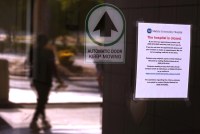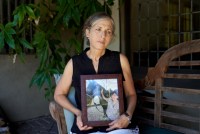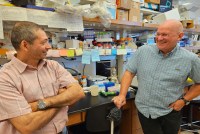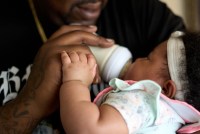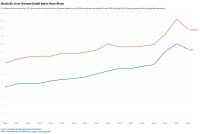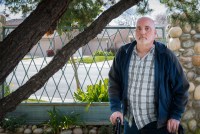California Offers Lifeline to 17 Troubled Hospitals
California’s new lending program for distressed hospitals will provide Madera Community Hospital with interest-free loans of up to $52 million if it can agree on a viable reopening plan with Adventist Health. The state will offer an additional $240.5 million in interest-free loans to 16 other troubled hospitals.
Naming Suicide in Obits Was Once Taboo. Changing That Can Help Loved Ones Grieve.
Mental health is being talked about more openly than ever, but the word “suicide” has remained largely taboo when describing how someone died. See why that’s slowly changing, what it means for people who grieve those deaths, and how candor can help prevent additional suicides.
Médicos abogan por nuevos esfuerzos para combatir al Chagas, un asesino silencioso
La enfermedad de Chagas, causada por un parásito, afecta principalmente a personas en las zonas rurales de Latinoamérica. Pero se estima que 300,000 personas en Estados Unidos viven con la enfermedad, que puede causar problemas cardíacos graves. Defensores de pacientes piden esfuerzos mucho más agresivos para combatirla.
Feds Say Hospitals That Redistribute Medicaid Money Violate Law
Federal officials are trying to clamp down on private arrangements among some hospitals to pay themselves back for the Medicaid taxes they’ve paid. State health officials and the influential hospital industry argue that regulators have no jurisdiction over the agreements.
Promising Better, Cheaper Care, Kaiser Permanente’s National Expansion Faces Wide Skepticism
Kaiser Permanente, the California-based health care giant, is looking to dramatically expand its national presence. It’s committed $5 billion to a new unit called Risant Health and has agreed to acquire Pennsylvania-based Geisinger, but skeptics wonder how it will export its unique model to other states.
Patients in California County May See Refunds, Debt Relief From Charity Care Settlement
As hospitals are criticized for skimping on financial assistance, Santa Clara County has agreed to notify 43,000 former patients of possible billing reductions as part of a settlement. Some patients had sued, alleging the county’s hospital system sent them to collections for bills they shouldn’t have received.
A Blood Test That Screens for Cancer: Does It Do More Harm Than Good?
The first of a new wave of cancer-detection blood tests likely saved Gilbert Milam Jr.’s life. But many cancer researchers, wary of overtesting, argue it’s premature to prescribe the Galleri test widely.
Medi-Cal Covers Gender-Transition Treatment, but Getting It Isn’t Easy
Pasha Wrangell has faced delays getting gender-affirming care because of red tape and limited providers. Over more than two years, Wrangell has received only about half the total electrolysis sessions recommended. Wrangell’s insurer through Medi-Cal, California’s Medicaid program, acknowledges the shortage of practitioners.
As a Union Pushes to Cap Hospital CEO Pay, It’s Accused of Playing Politics
A union is asking Los Angeles city voters to cap hospital executive pay at the U.S. president’s salary. However, hospitals accuse the union of using the proposal as political leverage, and policy experts question whether the policy, if enacted, would be workable.
Amid Lack of Accountability for Bias in Maternity Care, a California Family Seeks Justice
April Valentine’s family wants to know whether racism could have played a role in her death. A KFF Health News analysis shows state regulators are ill-equipped to find discrimination in its many forms.
As Water Reuse Expands, Proponents Battle the ‘Yuck’ Factor
As drought and climate change threaten water supplies, municipalities around the country are ramping up water reuse efforts. But they have to overcome the “yuk” factor.
Repeating History: California County Plugs Budget Gap With Opioid Settlement Cash
State attorneys general vowed that opioid settlement funds — unlike the tobacco settlement of the 1990s — would go toward tackling the underlying crisis. But in Mendocino County, officials have found a way to use some of its share to help fill a budget shortfall — a throwback to what agreement architects hoped to avoid.
Black Women Weigh Emerging Risks of ‘Creamy Crack’ Hair Straighteners
Social and economic pressures have long compelled Black girls and women to straighten their hair. But mounting evidence shows chemical straighteners — products with little regulatory oversight — may pose cancer and other health risks.
Bankrupt California Hospital Receives Lifeline From Adventist, Report Says
The Fresno Bee reports that Madera Community Hospital has reached an agreement with Adventist Health to take over the bankrupt facility and avoid liquidation.
Covered California to Cut Patient Costs After Democratic Lawmakers Win Funding From Gov. Newsom
California’s health insurance exchange will reduce how much some patients pay for care next year, including hospital deductibles, appointment copays, and prescription drugs. Lawmakers pressed Gov. Gavin Newsom to make good on a four-year-old pledge to use proceeds from a tax penalty on uninsured people to help people pay for treatment.
Pain Clinic Chain to Pay $11.4M to Settle Medicare and Medicaid Fraud Claims
The owner of one of California’s largest chains of pain management clinics has agreed to pay California, Oregon, and the federal government to settle Medicare and Medi-Cal fraud allegations.
Giant Health System Almost Saved a Community Hospital. Now, It Wants to ‘Extract Every Dollar.’
A bankruptcy judge will soon decide whether a Central Valley hospital needs to liquidate to repay its creditors. Its largest creditor, St. Agnes Medical Center, is the very entity that backed out of purchasing the Madera Community Hospital last December.
Industry Groups in California Vie for New Medicaid Money
State officials have promised to boost funding for California’s Medicaid program by $11.1 billion starting next year, with most of that money earmarked for higher payments to doctors, hospitals, and other providers. But the details have yet to be worked out, and powerful health industry groups are jockeying for position.
Excessive Drinking During the Pandemic Increased Alcoholic Liver Disease Death Rates
The number of Californians dying from alcoholic liver disease rose dramatically in the last decade, sped by the pandemic.
Medi-Cal’s Fragmented System Can Make Moving a Nightmare
When Medi-Cal beneficiary Lloyd Tennison moved last year from Contra Costa County to San Joaquin County, he was bumped off his managed care plan without notice before his new coverage took effect. His case highlights a chronic issue in California’s fragmented Medicaid program.




